- Home
- Courtney Milan
The Heiress Effect Page 2
The Heiress Effect Read online
Page 2
“Well, then. If not now, perhaps we might speak later. Tomorrow, or—”
“Or the next day or the one after that,” Bradenton finished with a gleam in his eye. “We have to teach Hapford how to get on before we teach him what to get on about. Now is not the time.”
That, apparently, was not an attitude shared by all. Hapford had looked up with interest when Oliver started speaking; at this, he frowned and turned away.
Oliver could have argued. But then…
“As you say,” he said mildly. “Later.”
A man like Bradenton needed to receive deference. He needed a neighbor who stopped five feet from the fence instead of challenging the property lines. Oliver had swayed the man before, and he knew how it was done. Bradenton could be directed, so long as nobody penetrated the illusion that he was in charge.
Instead, Oliver let the conversation meander to the subject of mutual friends, the health of Oliver’s brother and his wife. For a few moments, they could pretend there was nothing to this but a cozy, intimate environment. But then Bradenton, who stood by the window, raised his hand once more.
“Drink up,” he said. “The first lady has arrived.”
Whitting looked out the window and let out a whimper. “Oh, God, please no. Never tell me you invited the Feather Heiress.”
“Blame your cousin.” Bradenton lifted an eyebrow. “Hapford wants a few minutes in the corner with his fiancée. And for whatever reason, Miss Johnson insists on having her invited.”
“Speaking of whom,” Hapford said, with a quiet dignity that looked out of place on his boyish features, “I would prefer that we not slander my fiancée’s friends.”
Whitting let out a puff of air. By the grim look on his face, Oliver would have imagined that he had just been sentenced to three years of hard labor. “Spoilsport,” he muttered, and then edged up to Oliver. “Someone should warn you,” he muttered.
“Warn me about what?”
The man leaned forward and whispered dramatically. “The Feather Heiress.”
“Her wealth comes from…goose down?”
“No.” Whitting didn’t look at him. “It’s originally from transcontinental steamers, if you must know. She’s called the Feather Heiress because being around her is like being beaten to death by feathers.”
He looked utterly serious. Oliver shook his head in exasperation. “You can’t beat someone to death with a feather.”
“You’re an expert on it, are you?” Whitting raised his chin. “Shows how much you know. Imagine someone starts beating you with a feather. Imagine that they never stop, until one day, the constant annoyance of goose feathers pushes you over the edge. In a fury you strangle the person who has been beating you.” He demonstrated this with a wrench of his hands. “Then you hang for murder. You, my friend, have been beaten to death by feathers.”
Oliver snorted. “Nobody is that bad.”
Whitting put his hand to his head and rubbed at the furrows on his brow. “She’s worse.”
“Ah, ah,” Bradenton said, lifting a finger. “She’s almost here. That’s not how it’s done, gentlemen.” He emphasized the last word and then set down his glass. A gesture, and his young nephews followed him back to the entry. Oliver trailed after.
Yes, Oliver knew how it was done. He’d been on the receiving end of those almost-insults all too often. Upper-class politeness counted off cruelty not by the words that were spoken, but by the length of the silence that passed.
A servant opened the door and two women passed into the entry. One, swathed in folds of dark wool dotted with snow, was clearly a chaperone. She took down the heavy hood from her face, revealing gray, curling hair and a pinched mouth.
The other…
If ever a woman had wanted to announce that she was an heiress, this one did. She had made every effort to flaunt her wealth. She wore a fur-lined cloak, white and soft, and kid gloves with ermine showing at the cuffs. She gave a shake of her head and then undid the clasp at her neck—a clasp that shone with a golden gleam. As she moved, Oliver caught a sparkle at her ears, the glitter of diamonds and silver.
As one, the men stepped forward to greet her.
“Miss Fairfield,” the Marquess of Bradenton said. He had a pleasant tone in his voice, a convivial friendliness as he dipped his head to her.
“My lord,” she responded.
Oliver moved closer with the rest of the group, but stopped in his tracks when she took off her cloak. She was…
He stared and shook his head. She should have been pretty. Her eyes were dark and shiny; her hair was up, with a glossy riot of curls pulled out and artfully arranged about her shoulders. Her lips were pink and full, poised in a demure half smile, and her figure—what he could see of it—was precisely the sort he liked, soft and full, made up of curves that even the most determined corset could not hide. Under any other circumstances, he’d have found himself stealing glances all evening.
But looking at her was like picking up a luxurious peach and discovering it half-taken over by mold.
Her gown was ghastly. There was no other word for it, and even that one scarcely did justice to the thrill of helpless horror that traveled through him.
A little lace was in fashion. Falls at the cuffs, perhaps, or a few inches at the hem. But Miss Fairfield’s gown was lace all over—layer upon layer of the most intricate hand-knit stuff available. Black lace. Blue lace. Gold lace trim. It was as if someone had swept into a store, ordered three hundred yards of each of the most expensive kinds of lace, and then crammed every ell on one dress
This wasn’t a case of gilding the lily. If there was a lily underneath all that, it had long since been crushed to a pulp.
The party stopped in its tracks as she took off her cloak, frozen in wordless contemplation of a wardrobe that made the word “gaudy” sound sweet and demure by contrast.
Bradenton recovered first. “Miss Fairfield,” he repeated.
“Yes, you did already greet me.” She had a very pretty voice. If Oliver could shut his eyes—or perhaps look at her from above the neck—
She swept forward, too far forward, advancing on Bradenton until he actually took two steps back. This brought her earrings—heavy diamond stones clasped in silver—to dangle a few feet from Oliver’s eyes.
One of those earrings would buy his parents’ farm three times over.
“Thank you so much for the invitation,” she said. As she spoke, she folded her cloak.
One of the gray-liveried servants should have stepped forward and relieved her of the burden. But they, like everyone else, had been momentarily stunned by the hideousness of her apparel.
Miss Fairfield didn’t seem to notice. Without once looking to her side—without even glancing at Oliver—she handed him her cloak. His fingers took hold of it before he could register what she’d done. She turned away from him, greeted Hapford and Whitting, her voice pleasant, the back of her neck taunting him with little curls.
She’d handed him her cloak. As if he were a servant. A footman came up to Oliver, apologetically taking the unwanted burden from him, but it was too late. He could see the horrified smile on Whitting’s face, the one he didn’t quite seem able to repress. Bradenton, too, gave Oliver a too-amused smile.
He was long past the point of getting angry at little slights, and this one hadn’t even been intentional. But God, she was a disaster. He almost felt sorry for her.
Bradenton gestured behind Oliver. “Miss Fairfield,” he said, “there is another man here to whom you have not yet been introduced.”
“There is?” Miss Fairfield turned and finally set eyes on Oliver. “Goodness. I didn’t even see you when I came in.”
She’d seen him. She’d just thought he was a servant. A simple mistake; nothing more.
“Miss Fairfield,” Oliver said smoothly. “A pleasure.”
“Miss Jane Fairfield, this is Mr. Oliver Marshall,” Bradenton said.
She put her head to one side and looked at him. S
he was pretty. That annoying part of his brain couldn’t stop noticing it in spite of the garish way she’d rigged herself out. Pretty, if you liked the healthy glowing English rose sort of woman. Normally, Oliver did.
He wondered when she was going to realize her error. Her eyes narrowed in concentration, and a frown left a furrow on her chin.
“But we’ve met,” she said.
This was not what he had expected her to realize. Oliver blinked uncertainly.
“I’m sure we’ve met,” she continued. “You look familiar. There’s something about you, something…” Miss Fairfield tapped her lip with a finger, shaking her head as she did. “No,” she concluded sadly. “No. I am wrong. It’s simply that you look so common with that hair and those glasses that I mistook you.”
He looked common?
Another woman delivering an insult of that magnitude would have emphasized the word just to be sure that her intent was not mistaken. Miss Fairfield, though, didn’t act as if she was delivering a set-down. She sounded as if she were remarking on the number of pups in a litter.
“I beg your pardon.” He found himself standing just a little taller, looking at her with a hint of frost in his expression.
“Oh, no need to beg my anything,” she said with a smile. “You can’t help your looks, I’m sure. I would never hold them against you.” She nodded at him, as graciously as a queen, as if she were doing him a tremendous favor. And then she frowned. “I’m so sorry, but would you repeat your name again?”
Oliver gave her his stiffest bow. “Mr. Oliver Marshall. At your service.” Don’t take that literally, he almost added.
Her eyes widened. “Oliver. Were you named, perchance, after Oliver Cromwell?”
That was definitely not a genuine smile on his lips. His forgery nearly cracked under the strain. “No, Miss Fairfield. I wasn’t.”
“You weren’t named after the one-time Lord Protector of England? Why, I should have thought that he would be an example that your parents would have wished you to emulate. He started out common like you, didn’t he?”
“The name implies nothing so grand,” he managed to get out. “My mother’s father was named Oliver.”
“Perhaps he was named—”
“No,” Oliver interrupted. “Nobody in my family had hopes for my posthumous execution, I assure you.”
He almost thought she smiled at that, but the twitch at the corner of her lips disappeared before he was even sure it was there. There the conversation ground to a halt.
One, two, three…
As a boy, Oliver had gone back and forth between two worlds—between the heights of the upper class, so freezingly polite, and the more cheerful working class world that his parents inhabited. There was a frozen silence that Oliver associated with these moments of upper-class awkwardness. It was that moment when every man around made a calculation based on manners, and decided to hold his thoughts to himself rather than speak aloud and risk rudeness. He’d been on the receiving end of that silence all too often as a boy: when he’d admitted that he’d spent a summer in manual labor, when he’d referred to his father’s former occupation as a pugilist… In fact, for those first years until he’d learned the rules, silence had followed just about every time he had opened his mouth.
For all that it was supposedly born of manners, that silence could cut. Oliver had been on the outside of it often enough to know precisely how deeply. He glanced over at Miss Fairfield.
…four, five, six…
Her lips were smoothed into placid acceptance. Her smile was open and honest. There was no sign that she even noticed the tension.
“Who else will be joining us this evening?” she asked. “Cadford? Willton?”
“Not, uh—” Hapford glanced around. “Not Willton, he’s…indisposed.”
“Is that one of those—what do you call that thing, that thing someone says in order to avoid telling the truth?” Miss Fairfield shook her head, her diamond earbobs shaking. “The word for it is on the tip of my tongue. I can feel it. It’s a…a…” She raised her chin, her eyes suddenly bright. “Euphemism!” She snapped her fingers. “That’s a euphemism, isn’t it? Tell me, is he really just bosky from last night?”
The men exchanged glances. “Right,” Hapford said slowly. “Miss Fairfield, if you’ll take my arm…” He led her away.
“Poor man,” Whitting said. “He used to make fun, until Miss Johnson made him stop. He’s no fun now that he’s besotted.”
Oliver didn’t generally approve of mocking people behind their backs. It was cowardly and cruel, and he knew from personal experience that it was never as unobserved as the mockers supposed.
Poor Miss Fairfield. She had the opposite of conversation, the opposite of taste. They were going to rip her to shreds, and Oliver was going to have to watch.
Chapter Two
Dinner proved to be more painful than Oliver had imagined.
Miss Fairfield talked too loudly, and what she said…
She asked Whitting about his studies, and when he made a wry comment about preferring to concentrate his efforts on the study of liquids, she stared at him.
“How surprising.” Her eyes were very round. “I had not thought you to have the capacity of intellect to read physics!”
Whitting stared at her. “Did you—” The man seemed to grasp hold of his amazement with a visible struggle. A gentleman would never ask a lady if she had intended to call him stupid. Whitting took several deep breaths and addressed Miss Fairfield once more. “Yes. I do not have the sort of personality to enjoy the study of physics. As to my capacity…” He shrugged, and gave her a forced smile. “I must have misunderstood you.”
In the lexicon of English gentlemen—a language of euphemism and false politeness—this was one of the more stinging insults. “I must have misunderstood you” usually translated into, “Hold your tongue.” Oliver steepled his fingers and tried to look anywhere but at the two.
Miss Fairfield didn’t seem the least troubled. “Did you misunderstand me?” she asked in tones of solicitousness. “I am so sorry. I should have realized the sentence construction was too complex for your capacity.” She leaned toward him and spoke again, this time raising her voice and slowing her words as if she were talking to an aging grandfather. “What I meant was that I had not thought that you were intelligent. That would make the study of the physical world difficult.”
Whitting turned red. “But—that is—”
“Perhaps I am wrong,” she said cheerily. “Do you enjoy the study of the physical world?”
“Well, no, but—”
She patted his hand comfortingly. “There’s no need to worry,” she confided. “Not everyone has that capability. You make up for any lack of intellect by being so kind.”
Whitting sat back in his chair, his mouth working.
From another woman, that would have been an unforgivable insult. If Miss Fairfield had shown the slightest indication that she was being devastatingly awful on purpose, she would have been ostracized. As it was, when she patted Whitting’s hand, comforting him on his stupidity, she seemed actually to feel sorry for him.
She asked Hapford if he was going to take elocution lessons, and when he said no, hastened to assure him that nobody worth knowing would hold the quietness of his speech against him.
“Lemon juice,” she said, speaking to Oliver across the table, “would do wonders for your freckles. Have you considered it?”
“Would you know, my aunt says the same thing?” he murmured. “And I have yet to try it.”
“Oh, of course.” She looked stricken. “How thoughtless of me! I suppose it would be difficult to obtain enough lemons, especially for one in your position.”
Oliver didn’t ask what his position was supposed to be.
After that, she complimented the Marquess of Bradenton on the cut of his coat, assuring him that his unfortunate slope-shoulders were “almost unnoticeable.”
And when he sputtered in response and
turned away, she set down her serviette.
“Don’t feel embarrassed,” she said. “It’s acceptable to lose the flow of conversation. Not everyone is clever enough to think of something to say immediately.”
Bradenton’s lips thinned.
“And you’re a marquess,” she added. “Maybe there are deficiencies in your understanding, but nobody will ever notice them so long as you make absolutely certain to introduce yourself as a marquess first.”
Bradenton’s nostrils flared, but she was already turning back to address Oliver.
“Mr. Cromwell,” she said, “do tell me how you spend your days. You’re an…accountant, if that’s what I recall hearing.”
The truth was far more complicated. Besides, no matter what he said in reply, a woman who confused him with the long-dead Oliver Cromwell was unlikely to care about details. “I studied law at Cambridge,” he finally said. “But I have no need to practice, so I—”
“Oh, so you’re something like a solicitor, then? Perhaps you could explain something for me. How does a solicitor differ from an accountant? I had always thought they were cut from the same cloth.”
No, he wasn’t going to react. “A solicitor—”
“Because that’s all my solicitor ever does,” she said innocently. “Send me accounts. Do you do things besides send accounts, Mr. Cromwell?”
Oliver looked down the table at Miss Fairfield’s earnest face, her diamond earbobs flashing in the lamplight, and admitted defeat. There was no way to explain even the basics of the world to someone who was impervious to reality, and he had no wish to insult her while trying. “No, Miss Fairfield,” he said politely. “I think you have the general idea.” He looked away.
But she must have seen him grimace. She leaned forward. “Oh, poor Mr. Cromwell,” she said in kindly tones. “Are you in pain?”
He almost couldn’t make himself look back at her—but it would be impolite to ignore her. He turned, slowly, wondering what she was about to say.
She was looking at him with deep concern.

 Her Every Wish
Her Every Wish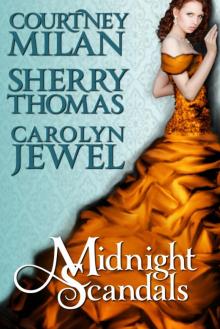 Midnight Scandals
Midnight Scandals After the Wedding
After the Wedding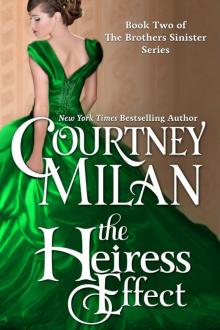 The Heiress Effect
The Heiress Effect Unraveled
Unraveled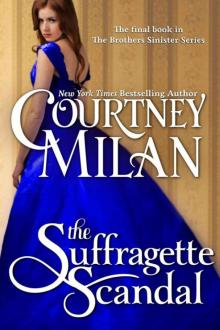 The Suffragette Scandal
The Suffragette Scandal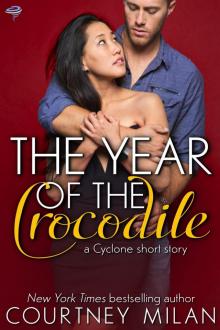 The Year of the Crocodile
The Year of the Crocodile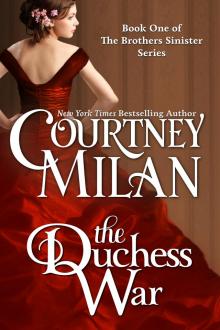 The Duchess War
The Duchess War What Happened at Midnight
What Happened at Midnight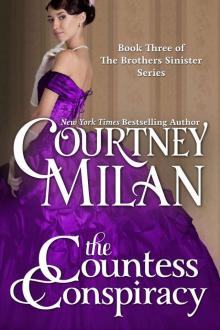 The Countess Conspiracy
The Countess Conspiracy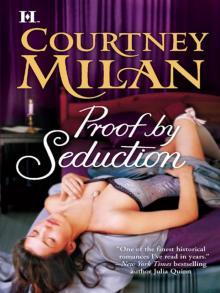 Proof by Seduction
Proof by Seduction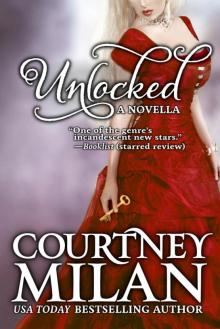 Unlocked
Unlocked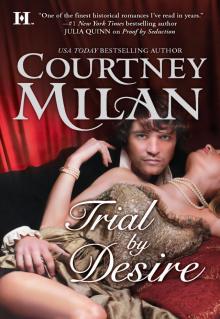 Trial by Desire
Trial by Desire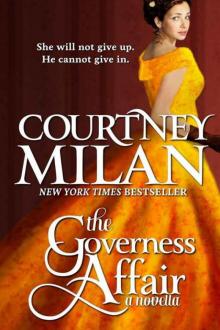 The Governess Affair
The Governess Affair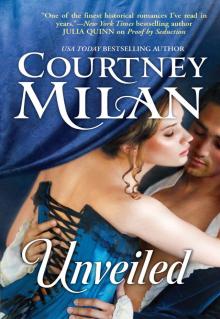 Unveiled
Unveiled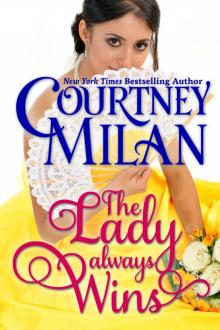 The Lady Always Wins
The Lady Always Wins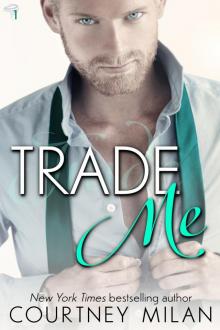 Trade Me
Trade Me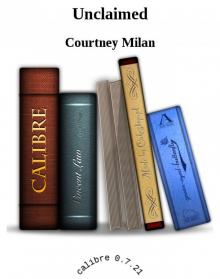 Unclaimed
Unclaimed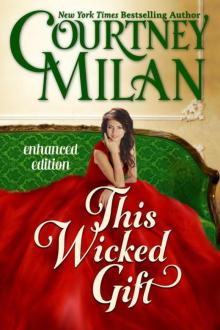 This Wicked Gift
This Wicked Gift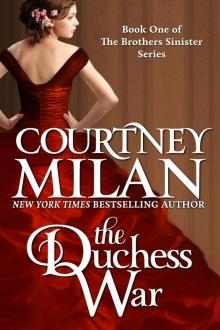 The Duchess War (The Brothers Sinister)
The Duchess War (The Brothers Sinister)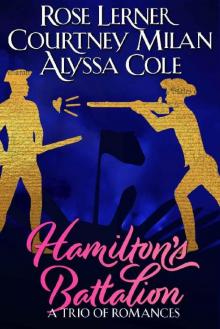 Hamilton's Battalion: A Trio of Romances
Hamilton's Battalion: A Trio of Romances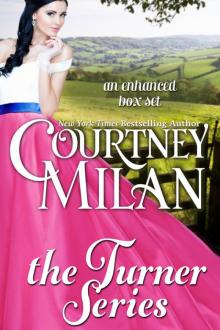 The Turner Series
The Turner Series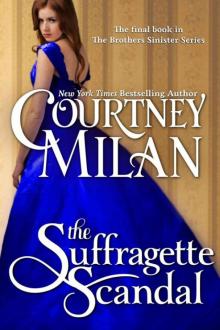 The Suffragette Scandal (The Brothers Sinister)
The Suffragette Scandal (The Brothers Sinister)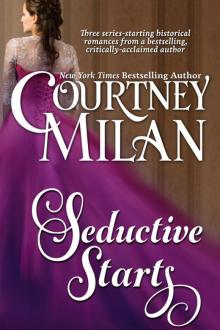 Seductive Starts
Seductive Starts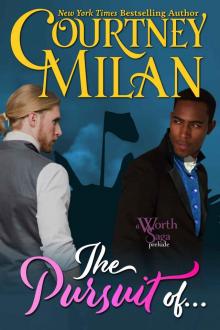 The Pursuit Of…
The Pursuit Of…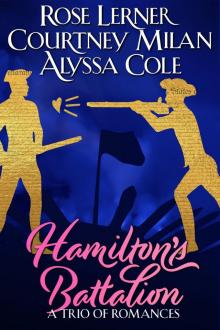 Hamilton's Battalion
Hamilton's Battalion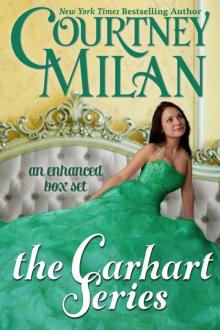 The Carhart Series
The Carhart Series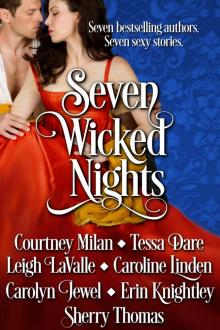 Seven Wicked Nights
Seven Wicked Nights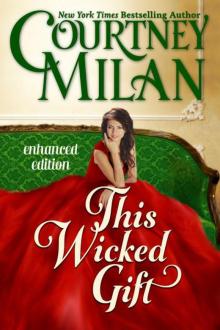 This Wicked Gift (A Carhart Series Novella)
This Wicked Gift (A Carhart Series Novella)